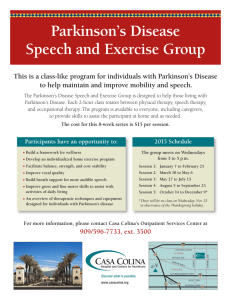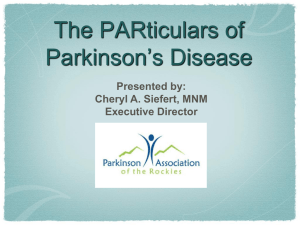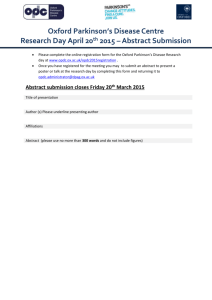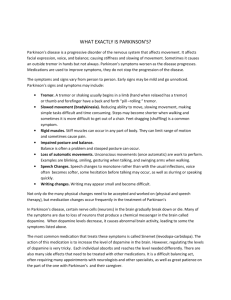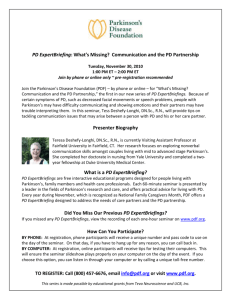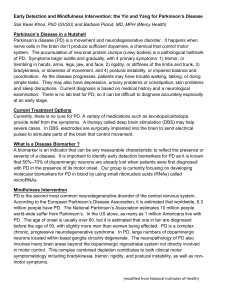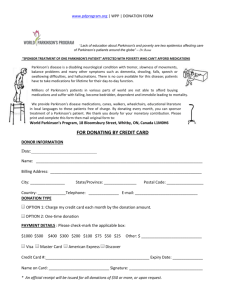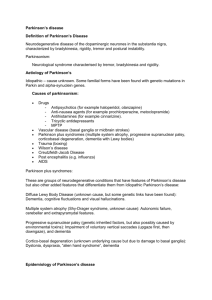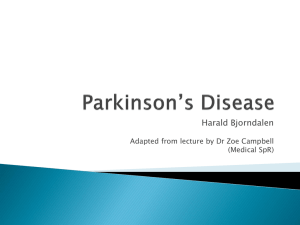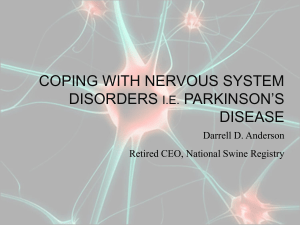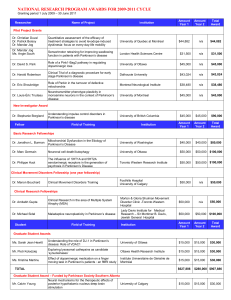You Only Live Once autor: Veronika Benešovská vedoucí práce: Mgr
advertisement
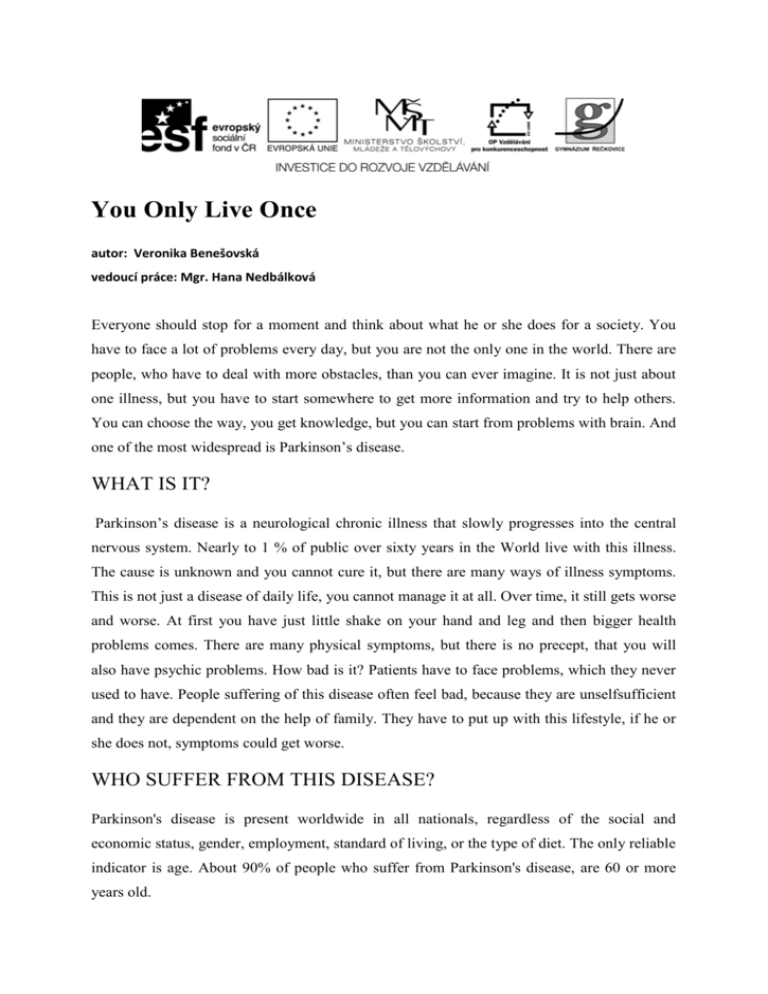
You Only Live Once autor: Veronika Benešovská vedoucí práce: Mgr. Hana Nedbálková Everyone should stop for a moment and think about what he or she does for a society. You have to face a lot of problems every day, but you are not the only one in the world. There are people, who have to deal with more obstacles, than you can ever imagine. It is not just about one illness, but you have to start somewhere to get more information and try to help others. You can choose the way, you get knowledge, but you can start from problems with brain. And one of the most widespread is Parkinson’s disease. WHAT IS IT? Parkinson’s disease is a neurological chronic illness that slowly progresses into the central nervous system. Nearly to 1 % of public over sixty years in the World live with this illness. The cause is unknown and you cannot cure it, but there are many ways of illness symptoms. This is not just a disease of daily life, you cannot manage it at all. Over time, it still gets worse and worse. At first you have just little shake on your hand and leg and then bigger health problems comes. There are many physical symptoms, but there is no precept, that you will also have psychic problems. How bad is it? Patients have to face problems, which they never used to have. People suffering of this disease often feel bad, because they are unselfsufficient and they are dependent on the help of family. They have to put up with this lifestyle, if he or she does not, symptoms could get worse. WHO SUFFER FROM THIS DISEASE? Parkinson's disease is present worldwide in all nationals, regardless of the social and economic status, gender, employment, standard of living, or the type of diet. The only reliable indicator is age. About 90% of people who suffer from Parkinson's disease, are 60 or more years old. PATIENTS HAVE TO FACE BIG PROBLEMS THE TOP THREE You definitely have to know about symptoms. There is no rule by which one you might be affected, but there are few which are avoided. Most patients are bothered by hypokinesia. This symptom annoys a person in daily activities. It means reduction of the amplitude of movements, total lack of free and reflex movements. Another symptom is tremor. A lot of people think, this is the main problem, but it is not true. From this symptom suffers only about 80-85 % patients. Parkinson’s tremor affects the upper and lower extremities asymmetrically. The last main problem is rigidity. Rigidity is manifested through increased resting tension and stiffness in muscles that movement resists. THAT IS NOT ALL! We can think, that the main problem really means the biggest one, but it is not true. Parkninson’s disease is followed by many other symptoms, which are sometimes even worse than these in top three. We are speaking about vegetative symptoms (which include: disorders of thermoregulation, seborrhea, constipation, problems with urination, sexual dysfunction), psychical problems (which include: panic attack, depression, dementia, sleep disorders) and sensitive symptoms (which include: pain, akathisia). HOW CAN DOCTORS HELP? Unfortunately, there is no treatment aimed directly at the disease. The only treatment is symptomatic therapy that relieves symptoms and improves functional status and quality of life. Basic and the most important medicament is Levodopa. It is amino acid, which is similar to basic building units of proteins. In advanced stages of Parkinson's disease with severe motor and involuntary movements is used a permanent probe, which is introduced into the small intestine and is continuously supplied in the form of levodopa gel. The biggest advantage of this treatment is the possibility of setting more balanced levels of levodopa in the blood. We cannot forget mention other medicaments - Antidepressants, hypnotics and antipsychotics belongs to psychopharmacs. Antidepressants are used to solve the most common psychological symptoms of Parkinson's disease. Depression is very deteriorating condition of the patient. Hypnotics are used for insomnia. Antipsychotics are used for relieving hallucinations and psychosis. There is also another way of treatment. This includes direct hit to the body and is called neurosurgery. Neurosurgery allows precise intervention into brain structures, so that we can make targeted intervention into the functions of the brain. There are many ways of treatment, but it depends on individual patient's problems. YOU CANNOT BE SURE, IF YOU ARE ILL! At first you have to let a person know, whether he or she suffers from this disease. Clinic diagnostics is based on anamnesis and neurologic examination. Presumptive diagnostics is established, if it hypokinesia, is present or one of top three” symptoms. The main test is responsiveness to levodopa. This means that there is improvement in the locomotor condition. Definitive diagnostics can be determined after a death of a patient (it is based on histological finding). Doctors, who were comparing original and the histopathological findings, found accuracy 91 – 92 %. HOW CAN I AVOID THIS DISEASE? The effective prevention of the disease unfortunately does not exist. The reason of the illness is unknown. However, materials are available, which are able to increase the production of dopamine, they are very effective on brain tissue and nervous system. The important producer of dopamine is vitamin B16 (contained for example in potatoes, fish, bananars, etc.). TRY TO HELP Parkinson’s disease is usually mistakenly associated with other related illnesses. People are little informed about symptoms (overall about this topic). As a consequence of that ignorance it often happens, that an old person, who has problems like tremor in their extremities (or other symptoms of the disease), has diagnosed senescence. Patient could have specialized treatment, which could make their life easier. Person usually go to doctor in an extreme situation, when symptoms are making his or her life very uncomfortable. However, if treatment had deployed from the beginning, person would feel much better, it can improve patient’s condition and make the life easier. RESOURCES [1] Rektor, Ivan et al. Parkinsonova nemoc. Doporučené postupy diagnostiky a léčby II. Pozdní stadium. Prague: Galén, 2004. Print [2] Růžička, Evžen et al. Parkinsonova nemoc: Doporučené postupy diagnostiky a léčby I. Časné stadium. Prague: Galén, 2004. Print [3] Rektor, Ivan and Rektorová, Irena. Parkinsonova nemoc a příbuzná onemocnění v praxi. Prague: Triton, 1999. Print [4] Woitres, e.Ch; Parkinsonsm and Related Disorders. Amsterdam: VU Universitz Press, 2007. Print
